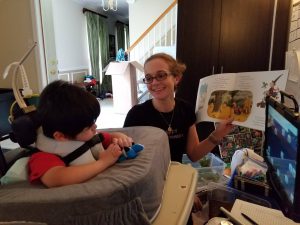 Halloween is long over, so you can file this post away from next year. My own children love the book, Room on the Broom, but when I read it with my “Is this for Joey?” eyes I realized just what a great book it is.
Halloween is long over, so you can file this post away from next year. My own children love the book, Room on the Broom, but when I read it with my “Is this for Joey?” eyes I realized just what a great book it is.
Room on the Broom, written by Julia Donaldson and Alex Scheffler, is the story of a witch who is riding around on her broomstick. As the wind picks up, her hat, bow, and wand are blown away. Each time she goes to look for an item she meets a new friend (a dog, a bird, and a frog), each who asks her if there is room on the broom for one more friend. Eventually the broom becomes so full that it breaks, and the witch falls next to a dragon who wants to eat her. Before he can, the friends she made room for band together to save her. On the surface level it’s a great story about inclusion and friendship. But let’s look beyond that. [Read more…]

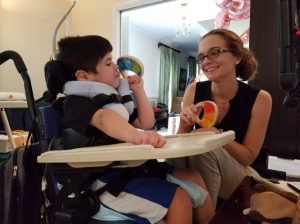 I love creating adaptive books, and love getting them into the hands of kids even more.
I love creating adaptive books, and love getting them into the hands of kids even more. 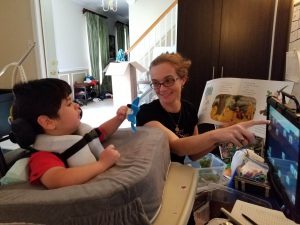 I had the opportunity to present research on using engaging reading aloud to promote language and symbolic play at the Council for Exceptional Children’s Early Childhood Conference this October. It was a wonderful opportunity to connect with other educators and hear about the current research in the field, particularly in the area of storybook reading.
I had the opportunity to present research on using engaging reading aloud to promote language and symbolic play at the Council for Exceptional Children’s Early Childhood Conference this October. It was a wonderful opportunity to connect with other educators and hear about the current research in the field, particularly in the area of storybook reading. 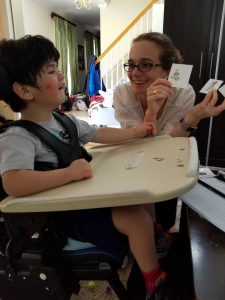 In my ongoing work with Joey I’ve learned that he doesn’t like to be prompted to use particular words. If I prompt him to use want, he’ll use every word BUT want, or will refuse to talk to me. It’s taken me awhile, but I’ve eventually learned to use more naturalistic methods and to accept Joey’s total communication, instead of demanding him to use the words I choose.
In my ongoing work with Joey I’ve learned that he doesn’t like to be prompted to use particular words. If I prompt him to use want, he’ll use every word BUT want, or will refuse to talk to me. It’s taken me awhile, but I’ve eventually learned to use more naturalistic methods and to accept Joey’s total communication, instead of demanding him to use the words I choose. 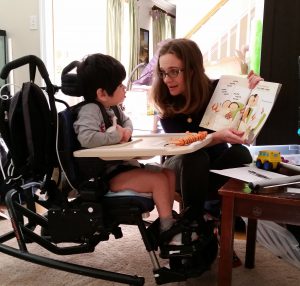 As most special education teachers are, I’m a bit of a data geek. I mean, I love data. I love tracking my students’ progress. I love seeing growth over time. I love looking for behavior patterns and I love standing back and asking “what does this tell us?”
As most special education teachers are, I’m a bit of a data geek. I mean, I love data. I love tracking my students’ progress. I love seeing growth over time. I love looking for behavior patterns and I love standing back and asking “what does this tell us?”
